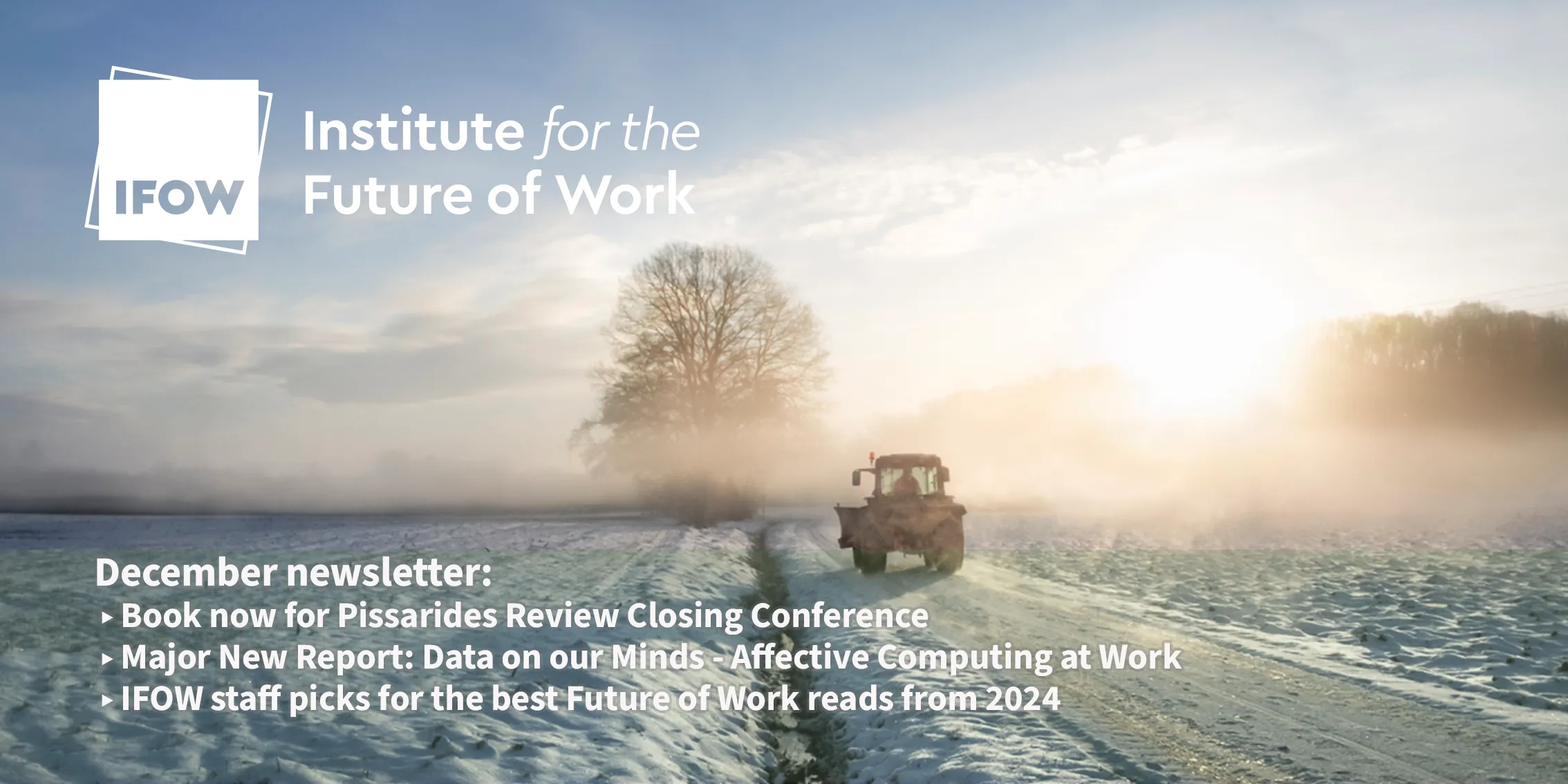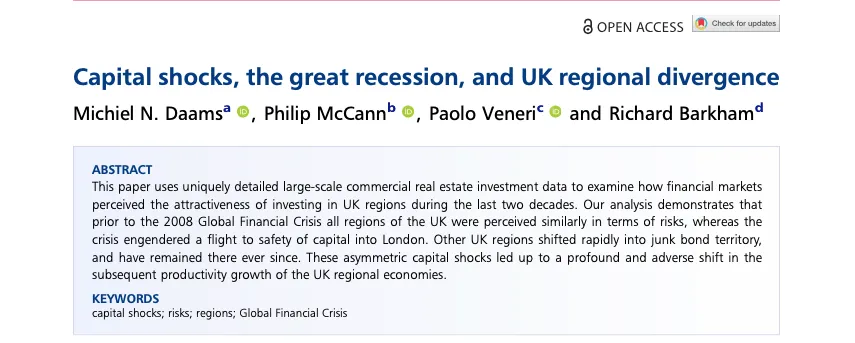We use cookies to personalise and enhance your experience on this site. By clicking Accept or continuing to use the site, you agree to our use of marketing and social media cookies as described in our Privacy Policy.
Accept and close
As 2024 comes to a close, we’ve been reflecting on a transformative year at IFOW, and looking to an equally exciting year ahead.
That begins with the major conference on 27th January reporting on our Pissarides Review – funded by the Nuffield Foundation. Spaces are very limited, so please secure one here as soon as possible. Based at a hub venue in The Shard, we will also be linking to satellite venues across the country. Find out more about the event here. The conference will consider the profound policy implications of 4 flagship workstreams which will remodel ‘automation’ and our opportunities to bring about systemic change.
In the past months we have been thrilled to be able to announce two significant new funding awards. The first is from Ufi’s VocTech Challenge Impact Network + Grant Fund to fund work we will be doing on addressing systemic barriers in adult learning and skills, an area which is so important as workers experience technological transition and we move closer to a ‘capabilities’ based approach to overcoming these barriers. The second is a continued partnership with Digit’s Centre for Digital Futures at Work programme, funded by the ESRC. This will focus on how the UK’s digital work ecosystem is evolving, and the economic and social impacts on people’s working lives and IFOW is proud to build on our impact partner role for the consortium.
We have also just launched a major new report led by Professor Phoebe Moore and Dr Gwen Barnard on neuro- and emotion-tracking workplace technologies, and the implications of this new frontier for people, firms and regulation. This report is a vital bridge between the Employment Bill and the Data Use and Access Bill, both making their way through Parliament now, helping to ensure that vital areas that may otherwise fall between the Bills are not missed and the UK seizes the opportunity to lead globally in this area of safe and responsible AI. See more in our Deep Dive below.
Wishing you a restful end to 2024.
Anna and the IFOW team
Deep Dive - Data on Our Minds: Affective Computing at Work
Late last week we published a major new report Data on Our Minds: Affective Computing at Work. Affective technologies attempt to infer workers’ emotions, and this is being combined with biometric and other data to feed into ‘Affective Algorithmic Management’ (AAM) systems, which can make automated decisions about shift patterns, rates of pay and performance ratings.
This opens up a new frontier in surveillance and privacy, and triggers questions about whether we need new workplace ‘neuro-rights’ as neurosurveillance begins to be normalised. We are delighted that The Times reported on the launch here.

The research – led by Professor Phoebe Moore and Dr Gwendolin Barnard - and supported by Trust for London and the Joseph Rowntree Charitable Trust, highlights how - without robust careful regulation, including sharpening existing proposals and new reporting and due diligence obligations on responsible actors, monitoring systems introduced on wellbeing grounds may well end up leading to ‘technostress’.
Led by the IFOW team, policy implications also consider health and safety, equality law updates, and regulator capacity building needed, alongside the relevance of international directions, including the EU AI Act and UNESCO recommendation on neurotechnology in September this year. Making decisions based on workers’ perceived emotions, represents a major change in management practice and decision-making, highlighting an extension of current proposals to boost employment and data protection in some key areas.
Read the full report here.

As the UK Parliament considers the Employment and Data Use and Access Bills, this report provides critical insights for shaping a regulatory framework that protects workers from new risks and shows the urgent need for a comprehensive socio-technical approach to innovation.
For this edition of our newsletter, we asked some members of the IFOW team to share one of their favourite reads from the past year and why they enjoyed it.

New research from the Pissarides Review highlights the critical role of regional and infrastructural factors in shaping the drivers and trajectories of transformation, as well as each region’s readiness for change. This helps policymakers identify regional strengths, bottlenecks, and the most effective points for intervention. As attention shifts to addressing regional inequalities in the UK—and their impact on opportunities for fulfilling work—Philip McCann and Michiel N. Daams offer valuable insights. Their paper, using large-scale commercial real estate investment data, examines how financial markets have perceived the attractiveness of UK regions since the 2008 financial crisis and how this perception has influenced regional economies. This analysis provides a robust framework for exploring overlapping policy spaces within the 'Future of Work' agenda.
My standout read this year is not new, but it’s been crucial to revisit as we conclude the Pissarides Review into the Future of Work and Wellbeing. Oosterlaken’s book provides a thoughtful exploration of the Capability Approach (CA) as a framework for evaluating how technology supports human development, emphasising people’s ability to flourish beyond productivity or economic gains. The book highlights the importance of participatory, community-led technological design and warns against “tokenism” in engagement. While written nearly a decade ago and focusing on earlier ICTs, its insights on the socio-technical systems shaping technological impacts, the role of conversion factors, and the need for justice in capability distribution remain deeply relevant. A new edition addressing today’s rapid technological advances, like generative AI and algorithmic management, would be invaluable.

The paper examines New York City’s Local Law 144, the first attempt to establish an algorithmic auditing regime for commercial machine learning systems. In the context of ongoing debates about AI accountability and the viability of audit regimes, Auditing Work provides a compelling case study on the challenges of implementing legislation with broadly interpreted provisions. By focusing on auditors’ experiences, the paper highlights the pressures of navigating experimental regulations, managing stakeholders, and negotiating system and data access where the law lacks specificity. It’s an essential read for understanding algorithmic audits and a valuable resource for IFOW’s work on algorithmic impact assessments. Notably, the paper won the Best Paper Award at FAccT 2024.

Slated as a gathering where world-leading academics, lawyers, technical experts, and policymakers convene to explore the evolution of ethical principles, evaluate developments in data and AI policy, this year's Summit reflects on and assesses the progress made in moving digital ethics forward in a year where the focus for organisations, policymakers, and regulators has been on finding the answers to the many questions surfaced and raised by the events of the year before.
Register here.

Join Manchester Digital's anticipated Tech Conference featuring insights on AI, keynotes, panels, and demos exploring cutting-edge innovations transforming industries. This is an opportunity to network with tech leaders, founders, and investors while engaging with emerging trends shaping the future.
Register here.
Hosted by Socialite Connections, this event provides professionals in the AI, Digital & tech industry an opportunity to gather and discuss innovation and build connections.
Purchase tickets here.

The London School of Economics (LSE) seeks one or two postdocs to join the Programme on Cohesive Capitalism in 2025. Open to candidates in economics, political science, and political theory, the position is for one year, with potential renewal. Fellows will lead independent research on themes like pre-distribution, economic cohesion, good jobs, and alternative economic paradigms.
Details here.